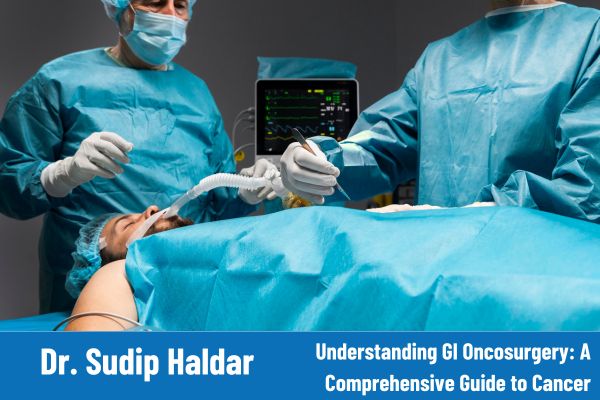GI Oncosurgery: Comprehensive Guide to Cancer Treatment and Surgical Interventions
Understanding GI Oncosurgery: A Comprehensive Guide to Cancer Treatment with Dr. Sudip Haldar Gastrointestinal (GI) cancers, which include cancers of the colon, stomach, liver, pancreas, and esophagus, can be difficult to treat due to their complexity. However, GI Oncosurgery has emerged as a vital tool in the management of these cancers, providing patients with the best possible chance for recovery and long-term survival. Dr. Sudip Haldar, a leading expert in GI Oncosurgery, shares insights on the types of surgeries, their benefits, and how these procedures have evolved to enhance patient outcomes. What is GI Oncosurgery? GI Oncosurgery refers to the surgical management of cancers affecting the gastrointestinal (GI) tract. Surgical intervention is often crucial for removing cancerous tumors, preventing their spread, and alleviating symptoms. The main goal is to eliminate cancer while preserving as much healthy tissue as possible, ensuring the patient’s quality of life. Types of GI Oncosurgery GI Oncosurgery encompasses various surgical procedures tailored to specific cancer types. Some common surgeries include: The Importance of GI Oncosurgery The key to successful treatment in GI cancers is early detection. Once the cancer has been identified, GI Oncosurgery becomes the cornerstone of treatment, aiming to remove the tumor and prevent metastasis (spread to other organs). Surgical options often offer the best chance of curing cancer, especially when the disease is localized. Moreover, in advanced cases where the cancer cannot be fully removed, surgery can help alleviate symptoms such as pain, obstruction, or bleeding. In some cases, palliative surgery may be recommended to improve the patient’s comfort and quality of life. Minimally Invasive GI Oncosurgery In recent years, minimally invasive GI oncosurgery has revolutionized the way GI oncologists approach cancer surgery. Using techniques such as laparoscopy or robotic surgery, surgeons can make smaller incisions, leading to: Dr. Sudip Haldar has adopted these advanced techniques in his practice, offering patients faster recovery times and better overall outcomes. Minimally invasive surgery is particularly advantageous for patients who are frail or elderly, allowing them to recover quickly and return to their daily lives. Recovery After GI Oncosurgery Recovery after GI Oncosurgery varies depending on the type of surgery performed, the extent of cancer, and the patient’s overall health. However, most patients can expect the following: Conclusion GI Oncosurgery, under the expertise of renowned surgeons like Dr. Sudip Haldar, plays a critical role in the management of gastrointestinal cancers. Whether through traditional or minimally invasive techniques, the goal remains the same: to eliminate the cancer and improve the patient’s quality of life. Early detection and surgical intervention offer the best hope for patients, with continued advancements in surgery helping to further improve outcomes. If you or a loved one is facing a GI cancer diagnosis, it’s crucial to seek expert consultation to discuss the most appropriate treatment plan tailored to your needs. Dr. Sudip Haldar and his team can provide compassionate care and cutting-edge surgical solutions for GI cancer treatment.
GI Oncosurgery: Comprehensive Guide to Cancer Treatment and Surgical Interventions Read More »

